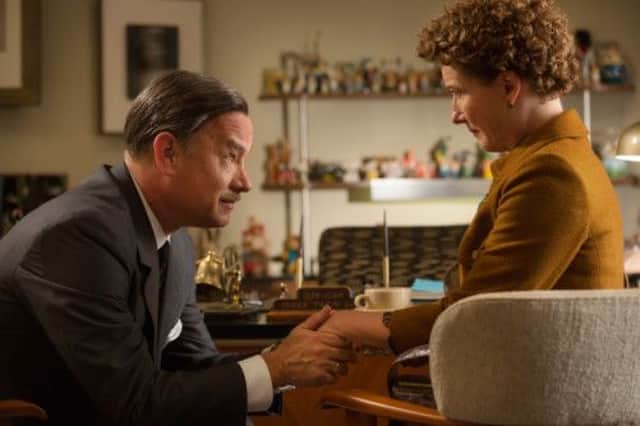Film review: Saving Mr Banks (PG)


SAVING MR BANKS (PG)
Directed by: John Lee Hancock
Rating: * * *
There’s something appropriately twinkly about Saving Mr Banks, a witty and warmhearted recreation of the behind-the-scenes drama involved in bringing Mary Poppins to the big screen. Homing in on the battle of wills that erupted between Walt Disney (Tom Hanks) and Mary Poppins creator PL Travers (Emma Thompson), it uses the amusing sparks that fly from this culture-clashing confrontation as a way to explore some of the darker aspects from her past that inspired her to create her beloved magical nanny in the first place.
Flashing back and forth between early production meetings on the film and her hardscrabble childhood in Australia, the film is mostly set in 1961 during a two-week period that Pamela Travers spent with Disney as he attempted to secure finally the rights to her stories. Having already been courted by the Mickey Mouse mogul for 20 years, Travers finds herself reluctantly agreeing to this meeting only after her exasperated agent informs her that she has no more money. That doesn’t affect her intractable nature, though. No fan of Mr Disney’s “silly cartoons”, his folksy charm or his love of merchandising (“Poor AA Milne,” she sighs when she is gifted some Winnie the Pooh trinkets upon arrival at her California hotel room), she arrives in Disney’s modish Burbank headquarters with both a list of demands and a steely determination not to relent on any of them.
Advertisement
Hide AdDirected by John Lee Hancock and written by Kelly Marcel, the film has great fun exploring all this. Unaware that Travers has yet to sign a contract, Walt’s creative team, including legendary composers Richard and Robert Sherman (respectively played by Jason Schwartzman and BJ Novak), are already hard at work creating the elements of the film that the world will come to know and love.
When Travers floats in, though, she’s less like Julie Andrews, more like an uptight angel of death, ready and willing to kill any and all creative quirks she feels don’t fit with her very British conception of how the character should be presented. No animation, no songs, no made-up words, no use of the colour red – her list of ‘no’s’ makes their lives a living hell and Walt is increasingly at a loss as to how to deal with her.
Luckily both Hanks and Thompson – the latter an especially canny piece of casting given that a new generation of Mary Poppins fans will likely know her as the creator and star of the hugely successful Nanny McPhee films – are immensely appealing here. Thompson gets all the best lines and she’s clearly relishing the opportunity to behave in an outrageously prickly manner. Of course, the film plays the creative tensions for comedy, but Thompson still manages to tinge her performance with below-the-surface sadness. Hanks, on the other hand, subtly strips a layer or two of showmanship from Disney’s public persona, reminding us that before he became an impresario of theme parks, a purveyor of branded family entertainment, and – let’s face it – a fairly ruthless businessman, he was first and foremost an artist. Of course, this is also a Disney film, so detractors will inevitably see this as a bit of a white-washed portrayal.
Nevertheless, there is a reason why the studio’s classic films, particularly those overseen by Walt himself, have endured over the years – and it’s not just down to a penchant for marketing. The film acknowledges that side of Disney, but at the same time, its gentle ribbing of the Disney corporate culture is also a little more cutting than one might expect; it’s just free from malice.
It’s too bad, then, that the film is almost a victim of its own success. Thompson and Hanks are so good they all but nullify the need for the flashback sequences to Travers’s terrible childhood in Australia. These scenes, which dramatise the complex feelings she had for her father (played by Colin Farrell), tend to bring the film to a screeching halt whenever we cut away to them.
The juxtapositions may spell out the ways in which writers – and artists in general – can take difficult aspects from their own lives and transform them into weird and wonderful creations far removed from such formative hardships, but the flashbacks themselves feel too heavy handed.
Advertisement
Hide AdWhat’s more, their prescriptive nature makes the Spoonful of Sugar mantra Hancock and Co appear to have adopted as a creative strategy somewhat redundant. In Saving Mr Banks, the sugary fun stuff ends up being the most substantial, while the attempts at weighty drama have a placebo-like effect.
Nevertheless, just as Dick Van Dyke’s inability to master a cockney accent has probably never stopped anyone from truly enjoying Mary Poppins, this film’s faults can’t detract from the work Thompson and Hanks do to make this a worthy tribute to its creation.